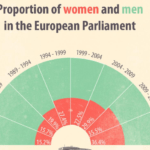Lockdowns to prevent the spread of Covid-19 trapped many women at home with abusers. Several countries saw spikes in domestic violence reports. As lockdowns ease, the European Institute for Gender Equality (EIGE) is taking a closer look at how we can protect women in times of crisis – be it a pandemic, natural disaster or economic recession
Domestic violence happens everywhere. Yet each EU Member State collects data in a different way, with important details sometimes missing. To properly measure the extent of violence and predict what will happen in a crisis, we need to know more. How many women have faced physical, sexual, psychological and economic violence? What was their relationship with the perpetrator? How many requests for protection orders have been granted? EIGE’s overview of how well Member States currently answer such questions will soon be published in our Gender Statistics Database
Support services need to be proactive and coordinated. Police, health and social services should work together to identify women at, particularly high risk, such as those who have previously faced violence at the hands of a partner. Working with perpetrators can also be effective and has been done online during the pandemic. EIGE’s Risk assessment and management guide can help police implement such a multi-agency approach to ensure no one falls through the cracks
Family, friends and neighbours should check in with those at risk and raise the alarm if they suspect violence. With abusers always present, lockdown measures can make it tricky to report. Government-led campaigns can help raise people’s awareness of domestic violence, how to spot it, and how to get help. In March, for example, about a quarter of calls to the domestic violence hotline in Spain came from friends and family. EIGE is delving deeper into what helps witnesses act and will be publishing its results later this year







Leave a Reply